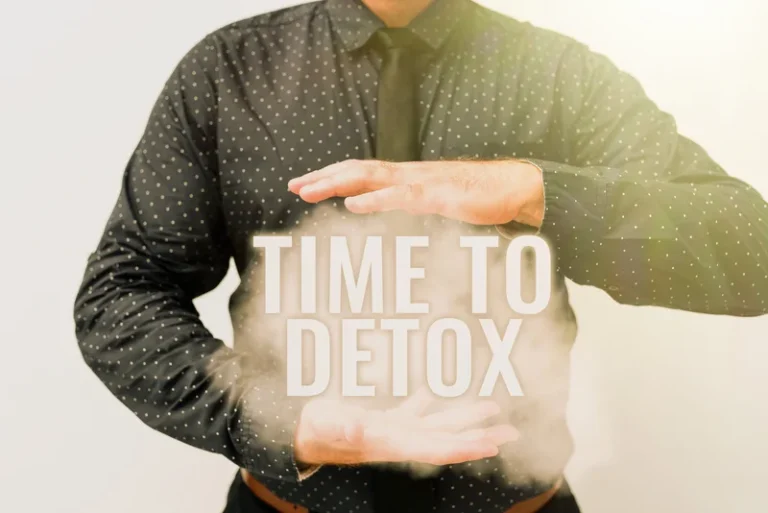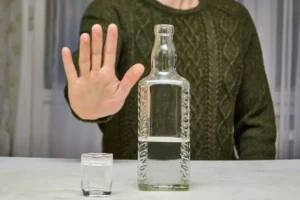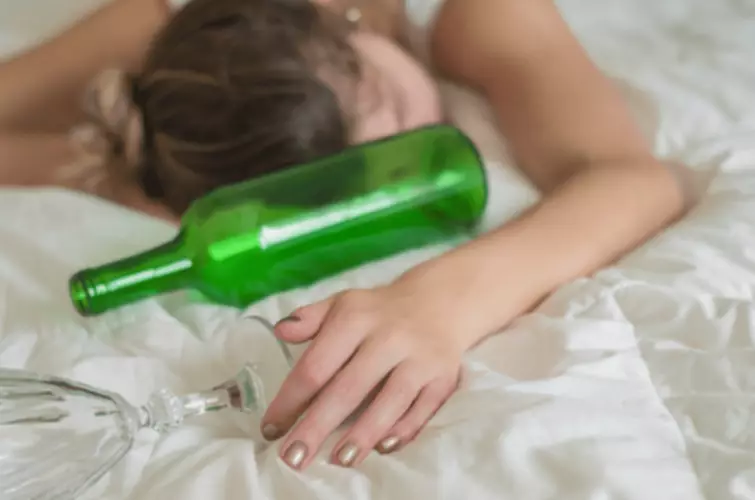Alcohol use disorder Symptoms and causes

But as you continue to drink, you become drowsy and have less control over your actions. Alcohol use disorder can include periods of being drunk (alcohol intoxication) and symptoms of withdrawal. There are many organized programs that provide the support of peers, usually through frequent meetings. Alcoholics Anonymous is one example; it offers a structured 12-step path toward recovery with a community of support from those who have dealt with similar challenges. For more information on symptoms, causes, and treatment of alcohol use disorder see our Diagnosis Dictionary.
Ohio Mental Health Statistics
At Carolina Center for Recovery, we work with family members, co-workers and other professionals, as well as directly with the individual in need of support to provide comprehensive care and treatment for addiction. We can offer guidance and insight into the recovery process, and will work to provide you with clarity into the steps that lay ahead. Once detox is complete, alcoholics can begin tackling problematic https://ecosoberhouse.com/ behaviors related to their addiction and learn how to live sober again. Because alcoholism is a chronic disease and alcohol relapse is common, persistence is a necessity — but success is achievable. While end-stage alcoholism is a dire situation, it’s not a hopeless one. Late-stage alcoholics can get better if they seek treatment, and some of their health problems can even be reversed if caught early enough.
Pre-Alcoholic Stage

Over time, increased cortisol levels leave a person feeling unable to cope with normal life events without alcohol, as they are more stressed and anxious than the average population. Ultimately this can lead to psychological or physical dependence upon alcohol. Mental health issues can cause a void that alcohol appears to fill, creating a sense of relief, comfort or even euphoria.

Special Health Reports
Some chronic alcoholics develop a condition called Wernicke-Korsakoff syndrome, which results from a thiamine (vitamin B-1) deficiency. The condition, which is sometimes called wet brain, is characterized by eye movement disorders, loss of muscle coordination, confusion and memory issues. It affects more men than women and is fatal 10 to 20 percent of the time. Those in the end stage of alcoholism, or late or deteriorative stage, are consumed by their drinking. Years of chronic alcohol consumption have ravaged their body and mind, and their lives revolve around little else other than the bottle.
- If you feel that you sometimes drink too much alcohol, or your drinking is causing problems, or if your family is concerned about your drinking, talk with your health care provider.
- There are many organized programs that provide the support of peers, usually through frequent meetings.
- Though it is well known that individuals with addiction are often highly stigmatized, the judgment and stigma attached to sobriety is also very real.
Programs are usually 30 days long and during this time individuals suffering from alcoholism will receive the care and support they need to start their journey to sobriety. Stress is a risk factor for many kinds of nonadaptive behavior, and addiction is one. Researchers have long linked the effects of chronic stress to alcohol use. There is some research to support the view that adverse events in childhood and in adulthood change the responsiveness of brain systems. Stress also increases the risk of mood and anxiety disorders, which are linked to addiction. There are many risk factors for addiction, from individual factors such as stress tolerance and personality makeup to social factors such as friendships and educational and job opportunities.

- There are several organizations geared specifically to treating the families of alcoholics, including Alanon.
- To avoid these uncomfortable symptoms, which can occur as soon as six hours after people who are dependent on alcohol consume their last drink, a person may begin drinking frequently or around-the-clock.
- In addition to ongoing mental health support, enhancing an individual’s “recovery resources” is also important.
Surgeon General recommends that pregnant women abstain from drinking alcohol during pregnancy. Long-term drinking can leave permanent damage, causing the brain to shrink and leading to deficiencies in the fibers that carry information between brain cells. Many alcoholics develop a condition called Wernicke-Korsakoff syndrome, which is caused by a deficiency of thiamine (a B vitamin). This deficiency occurs because alcohol interferes with the way the body absorbs B vitamins. People with Wernicke-Korsakoff syndrome experience mental confusion and lack of coordination, and they may also have memory and learning problems. Identifying problems with alcohol early can help prevent dependence and addiction.
Treating alcohol abuse

Research has shown that the two genes ADH1B and ALDH2, which control alcohol metabolism, are key factors in developing alcoholism along with several others. Whether at home, at work, or in any other environment that causes stress, some people will have a drink to unwind and relax. A drink can help some relax and calm down at the end of a chaotic day. However, for those who develop an alcohol use disorder, this becomes a coping mechanism and turns into a maladaptive, repeating pattern. The number of drinks and the frequency of drinking steadily increase. These physiological changes contribute to the increasing tolerance seen in early-stage alcoholics.
Addressing underlying stressors and seeking healthier coping strategies are important steps in preventing alcoholism related to stress and trauma. However, like other chronic health conditions, the interaction between genes and environmental variables substantially impacts an individual’s susceptibility to alcohol and drug use disorder (AUD). In addition, a child’s risk of developing alcohol use disorder might be affected by why do people become alcoholics the drinking patterns of their parents. While the American Psychiatric Association used to separate alcohol abuse and alcohol dependence into two distinct disorders, both are now categorized into a single diagnosis called alcohol use disorder. An alcohol use disorder, which can range from problem drinking to alcoholism, can be classified as mild, moderate or severe, depending on a person’s symptoms and drinking behaviors.
Alcohol Poisoning: Symptoms, Causes, Complications, and Treatment

This includes breathing, heart rate, body temperature, and gag reflex, which prevents you from choking. Over time, excessive drinking can lead to mental health problems, such as depression and anxiety. Alcohol abuse can increase your risk for some cancers https://ecosoberhouse.com/ as well as severe, and potentially permanent, brain damage. It can lead to Wernicke-Korsakoff syndrome (WKS), which is marked by amnesia, extreme confusion and eyesight issues. WKS is a brain disorder caused by a thiamine deficiency or lack of vitamin B-1.

Understand the Risks of Alcohol Abuse
For example, some craft beers may have four times the amount of alcohol that’s in a regular beer. Be aware of the alcohol content of what you’re drinking and adjust how much you drink based on this knowledge. Alcohol intoxication occurs when a person drinks an excess of alcohol in a short period. Alcohol intoxication occurs when a person drinks an excess of alcohol in one period. Keep reading to learn more about alcohol intoxication, including its causes, symptoms, and treatments. Although people can safely consume alcohol without experiencing immediate adverse health effects, long term alcohol consumption can jeopardize overall health.
- It’s not necessary to have all the above symptoms before seeking medical help.
- Even after a person is released from hospital care, it can take up to a month for them to feel normal again.
- These findings typically occur as the patient is recovering from the initial intoxication.
- When combined with other evidence-based therapies, such as cognitive-behavioral therapy (CBT), MAT can help prevent relapse and increase your chance of recovery.
- Jehovah’s Witnesses allow moderate alcohol consumption among its members.
As Blood Alcohol Concentration Increases—So Do the Risks
- Although people can safely consume alcohol without experiencing immediate adverse health effects, long term alcohol consumption can jeopardize overall health.
- In the Church of Jesus Christ of Latter-day Saints, alcohol consumption is forbidden,[52] and teetotalism has become a distinguishing feature of its members.
- These stages can help prevent relapse and support people to live healthier, fuller lives.
Low blood sugar is another sign of possible alcohol poisoning. Watching a loved one endure the end stages of alcoholism can be frustrating and lonely. For those who need help and don’t want it, intervention may be the only alternative. Alcohol stages of alcohol intoxication use disorder is a progressive disease that includes a beginning, middle, and end stage, which can result in life-threatening health conditions. It’s not often talked about, but left untreated, alcohol use disorder can be a fatal disease.
Medical Professionals

They are peer-led organizations dedicated to helping each other remain sober. Support groups can be the first step towards recovery or part of a long-term aftercare plan. When combined with other evidence-based therapies, such as cognitive-behavioral therapy (CBT), MAT can help prevent relapse and increase your chance of recovery.


For a woman, it’s four or more drinks in the same time frame. Teens and college-age adults are most likely to engage in binge drinking. Binge drinking is defined as drinking that brings blood alcohol concentration (BAC) to 0.08% or higher. The intoxicated person has lost consciousness and is struggling to breathe properly. Their heart rate has likely slowed as well, and their body temperature is dropping dangerously low. At this stage of intoxication, the person’s behavior will be normal with no visible signs of intoxication, such as slurred speech or delayed reaction time.
Finding support
- Alcohol intoxication is described as a mental and behavioural disorder by the International Classification of Diseases.
- Because it takes time for alcohol to have an effect on the body, consuming the large amounts required to reach these BAC levels can occur while the person is still reasonably sober.
- It’s not often talked about, but left untreated, alcohol use disorder can be a fatal disease.
- Even small increases in BAC can decrease motor coordination, make a person feel sick, and cloud judgment.
- Outpatient treatment is less intensive than inpatient or partial hospitalization programs.
- If you or your friend are under the legal drinking age, you might be worried about the legal consequences.
Boston Health Care for the Homeless Transitions Treatment Program
Substance abuse typically leads to addiction, which requires specialized treatment programs at Boston Health Care for the Homeless – Transitions Treatment Program to address. Many people benefit from inpatient drug rehabilitation, which includes inpatient acute care and residential rehabilitation. Other levels of care include intensive outpatient https://ecosoberhouse.com/ therapy, individual counseling, and support groups. Family therapy is also an essential part of treatment for substance abuse. The Boston Health Care for the Homeless – Transitions Treatment Program employs a multidisciplinary approach that emphasizes evidence-based interventions to help individuals suffering from addiction and mental illnesses.
Addiction can devastate a community as families are torn apart and crime rates increase. The most commonly abused drugs in Mattapan are heroin and cocaine, followed by marijuana and prescription drugs. Some common treatments include outpatient programs, 12-step programs, and residential rehab centers. After treatment, addiction treatment can be frightening for newly sober people.
Eco Sober Houses
The walls are light green, and the room is tidy, with twin beds on opposite sides. His boyfriend, Thom Greve, has been with him through his first round of rehab, and subsequently his relapse. Greve says living with an addict freshly out of treatment https://ecosoberhouse.com/boston-sober-house-mattapan/ can be hard, because he can’t always provide the supervision Schopplein needs. Schopplein has been struggling with recovery for the last three years, since he was 19. Police arrested Murchison a few minutes later at a home on Deering Road.
The Task Force now consists of a bipartisan coalition of local and state elected officials, law enforcement, administrative staffers, subject matter experts and residents working together, she said. They recognize that that sober living and recovery homes can be vital in the recovery process, but also recognize that there are irresponsible and even criminal operators preying on vulnerable people. Clients of Hope House are encouraged to plan for a safe living environment to discharge to at the beginning of their treatment. Hope House Addiction Services works with the client to find the best fit for their individual needs and the level of care that will support their recovery goals.
A Guide to the New Sober House Directory
This may include mental health treatment, medical care, food security, employment, education, relationships, and housing. A patient may be referred to community programs and/or practitioners who have affiliation agreements with Hope House Addiction Services to address special needs. In Mattapan, MA, 12% of residents are addicted to drugs and 70% are between the ages of 18 and 25.

Why Do Alcoholics Crave Sugar? The Science Behind the Cravings

This is particularly relevant for individuals with a history of substance abuse, as years of poor nutrition on an alcoholic liquid diet can lead to these health issues. Therefore, a focus on proper nutrition and physical health is crucial in alcohol recovery treatment plans 5. However, further research is needed to fully comprehend the impact of sugar on alcohol recovery and to determine the most effective approaches for managing alcohol cravings. Another important aspect of recovery is managing the sugar cravings that often come with alcohol recovery. Sugar activates the brain’s pleasure center in a similar manner to alcohol and drugs, and research indicates that sugar can be even more rewarding than these substances.
- The relationship between sugar consumption, alcohol cravings, and the risk of relapse is a complex subject that requires careful examination.
- Two key biological factors to consider are the impact on brain chemistry and blood sugar imbalances.
- While the exact nature of the relationship between alcohol and sugar cravings is complex, there appears to be a connection between these two types of cravings.
- Dysbiosis refers to an imbalance in the types and quantities of bacteria in the gut, which can affect digestion, nutrient absorption, and overall gut health.
Types of Mental Illnesses That Lead to Addiction

Intermittent, excessive sugar intake can lead to behaviors similar to drug addiction, including bingeing, withdrawal, craving, and cross-sensitization. This suggests that overconsumption of sugar amphetamine addiction treatment may trigger addiction-like responses in the brain, further fueling cravings for sugar. In addition to causing physical harm such as liver damage and increased risk for certain cancers, alcoholism can also have devastating effects on relationships, finances and overall quality of life.
Discovering the Link Between Prescription Painkillers and Heroin
- This impairment can lead to a diminished ability to resist cravings and make rational choices, further fueling the cycle of alcoholism and sugar cravings.
- “Is vaping marijuana safe?” Discover the health risks, regulatory stance, and safer alternatives.
- Understanding that the desire for sweets following alcohol abstinence is a normal phenomenon is the first step towards managing it effectively.
- Poor nutrition during recovery can lead to weight gain, low mood, and increased vulnerability to alcohol relapse.
Department of Veterans Affairs, about 46.4% of individuals who struggle with lifetime PTSD also… Discover what a holistic treatment center for addiction offers—natural therapies for complete healing and support. Interestingly, this same SNP also showed association with DSM-IV alcohol dependence, but to a lesser extent with dependence without craving 5. Discover the six common roles of family members of addicts and how they impact healing and relationships. Explore the cognitive consequences of methamphetamine addiction and its devastating effects on the brain’s function.

Role of Dopamine in Sugar Cravings

Now let’s get into what we can do to consume less sugar, and whether it’s possible, or necessary, to cut it out completely. While that can be helpful, I guess, to have that information, I don’t know that that level of detail is probably necessary if you don’t have diabetes or don’t have a medical reason why. Then find healthier alternatives to satiate your cravings, such as fruits and increasing your protein intake. Regular exercise and staying hydrated are also excellent do alcoholics crave sugar strategies. Emotional support from friends, families, or support groups can do wonders. Coaching can provide individualized strategies factoring your particular state and needs.
How to Develop Healthy Coping Mechanisms During Addiction Recovery
Consulting with a healthcare professional or registered dietitian can provide personalized guidance on dietary needs, meal planning, and strategies to manage sugar cravings. By prioritizing nutrition, individuals can support their recovery journey and improve their overall well-being. Navigating the complexities of sugar cravings and their impact on alcohol recovery requires an individualized approach.
- While this craving is common, especially in the early stages of recovery, understanding and managing these cravings is essential for sustained sobriety and overall health.
- This is because of the strong connection between the cravings for sweet foods and addictive behaviors.
- Alcohol consumption can also negatively impact blood sugar control, particularly in individuals with diabetes.
- But your brain doesn’t give up without a fight, so it increases the functioning of the glutamate system.
- Discover the best inpatient detox centers for effective recovery with 24/7 support and personalized care.
- Explore effective opiate addiction treatment options in Kansas and start your recovery journey today.
Cognitive Consequences of Methamphetamine Addiction
Further complicating this landscape is the genetic component, as certain genes may predispose individuals, particularly those with https://ecosoberhouse.com/ alcoholic parents, to develop a preference for sweet foods. This intrinsic link suggests a deeper biological basis for cravings that extend beyond mere habit or taste. Discover the costs of drug rehab without insurance, factors influencing expenses, and financial aid options to make recovery accessible. Discover how rehab helps drug addicts overcome addiction through trusted rehab services, therapy, detox, skill-building, peer support, and aftercare for lasting recovery. And they both affect your brain’s reward system by releasing dopamine, which helps regulate movement, emotion, and motivation.
Less alcohol, or none at all, is one path to better health
In addition, it can temporarily help with physical symptoms like stomach upset, anxiety, and (some say) pain.Secondly, weed is very socially acceptable in today’s world. Now that it is recreationally legal in many states, attitudes about it have shifted towards being even more tolerant. It’s not uncommon to hear people speak about marijuana as though it is a miracle drug that does nothing but good for the world.And finally, weed doesn’t create devastating consequences in people’s lives very quickly.
The Abstinence Mentality
Second, eat healthy foods and avoid sugary snacks, as they can make you feel more sluggish. Finally, get some exercise; a short walk or run can help to increase your heart rate and speed up the sobering process. Acknowledging and celebrating the hard work of recovery is helpful for keeping you motivated and reminding you why you took this brave step toward sobriety in the first place. Just be sure that your rewards don’t involve drugs or alcohol.
Finding Treatment for Alcoholism
- Time is the best antidote to a too-intense weed high, but in the meantime, there are more ways to make yourself comfortable while waiting it out.
- However, research suggests that while 12-step groups are effective, people often don’t continue their involvement at beneficial levels over the long term.
- But, if people do not want to participate in AA or similar groups, they may look for other types of assistance.
- The fact that we don’t usually see people resorting to extreme measures to get high leads us to believe that weed isn’t a problem and therefore can be used without consequence.So, how do you get sober from weed?
Relapse can be a very difficult experience to overcome, but it is possible. With the right support and treatment, you can get back on track and continue working towards your goal of sobriety. For many people with a substance use disorder, it’s simply a matter of never having learned the appropriate way to manage anger. Talk to your therapist, other healthcare provider, or sponsor about how to deal with your anger in ways that won’t cause you to harm yourself or others or turn to alcohol or drugs. But for most people, staying sober isn’t that straightforward. The more strategies you learn to identify triggers, cope with stress, and manage your new sober life, the easier it is to prevent relapse.
Taking CBD in Recovery: Are You Still Sober?
- Alcohol breaks down in the body into a substance called acetaldehyde, which can damage your cells and stop them from repairing themselves.
- It is estimated that up to 80% of those who find long-term sobriety had at least one relapse along the way.
- They might have commitments at the same time or childcare responsibilities.
- But attitudes about cannabis use continue to shift over time.
- Spending more time with supportive loved ones and planning activities for the entire family can also help you develop a healthier lifestyle and avoid situations in which you would normally drink or use drugs.
Sobriety can be a fixed-term goal like staying sober for a set period (such as Dry January), or a lifelong goal of staying sober from all substances. Cannabis, now legal in 24 states, is a $40bn industry in America. That may not be much compared to the $260bn alcohol market, but a shift is afoot.

Research shows that if you maintain these types of toxic relationships, your chances of relapsing are greater. To avoid relapse and remain sober, it’s important to develop healthy relationships. Some of the immediate changes you getting sober without aa will need to make will be obvious—like not hanging around the people that you used with or obtained drugs from. After all, you can’t hang around your drug dealer or old drinking buddies and expect to remain sober for very long.
Will my Insurance cover the cost of addiction treatment?
- Just keep in mind that your improvements won’t happen overnight.
- Unfortunately, a commitment alone is usually not enough to get sober.
- Whether it’s stress at work, a failed relationship, financial problems, or another major hurdle, substance abuse becomes a crutch to mask the pain caused by life’s challenges.
- If these emotions become excessive, they can hold you back from recovery.
- If someone is taking a drug for a medical reason and it has side effects, it does not mean that they are abusing that drug.
- Feeling guilty or ashamed of past behavior or actions during active addiction is natural and healthy.
Bottom line: Can you be sober if you smoke weed?
What Does It Mean to Be ‘Cali Sober’? – The Cut
What Does It Mean to Be ‘Cali Sober’?.
Posted: Thu, 24 Oct 2019 07:00:00 GMT [source]

